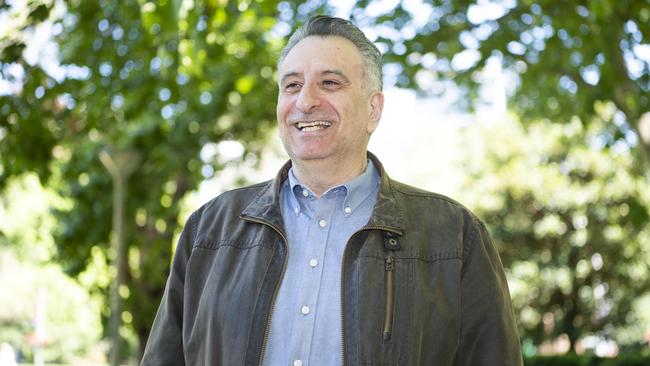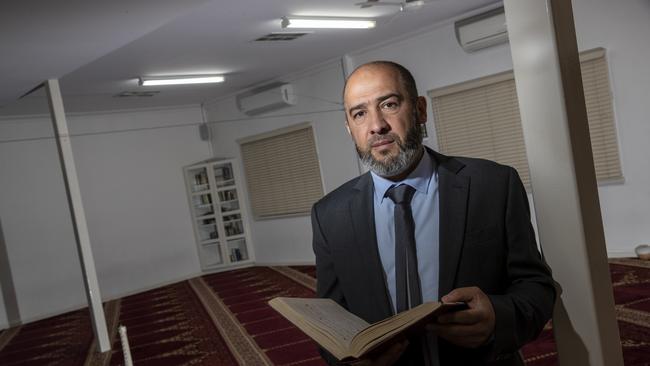AFIC chief Kamalle Dabboussy ‘grateful’ to be reinstated amid sexual harassment claims
The chief executive of Australia’s peak Islamic council, who was sacked for allegedly making ‘suggestive and sexual’ comments to a new employee, has been temporarily reinstated ahead of a lengthy Federal Court fight.

The chief executive of Australia’s peak Islamic council, who was sacked for allegedly making “suggestive and sexual” comments to a new employee, says he is “grateful” to have been temporarily reinstated ahead of a lengthy Federal Court fight.
Australian Federation of Islamic Councils CEO Kamalle Dabboussy was terminated earlier this month after allegedly telling his new female colleague that “the camera doesn’t really do you justice”, and keeping “prolonged eye contact” with her which made her feel “extremely awkward and uneasy”.
Mr Dabboussy has since filed a Federal Court case claiming he was unfairly terminated by president Rateb Jneid after independent investigator Worklogic found the woman’s complaint was “substantiated on the balance of probabilities”.
Mr Dabboussy had a minor win on Tuesday after judge John Nicholas found there was merit to allegations that AFIC unlawfully terminated him just seven hours before he was entitled to lodge an unfair dismissal claim. As such, Justice Nicholas found AFIC must reinstate Mr Dabboussy to his former position while proceedings progress.
“I am grateful for the judgment yesterday, but there’s still a way to go,” Mr Dabboussy told The Australian. “The judgment speaks to some of the arguments used. I’m not in a position to say much more.”
In writing his interim judgment, Justice Nicholas said AFIC relied on evidence including an email from the female employee to Dr Jneid alleging Mr Dabboussy treated her inappropriately.
“She asserts that Mr Dabboussy inappropriately told her several times that ‘the camera really doesn’t do you justice’ during the course of their meeting on 24 July 2024 at AFIC’s Zetland office, and also complains of inappropriate conduct involving unnecessary and prolonged eye contact which made her feel extremely awkward and uneasy,” his judgment reads.

Dr Jneid wrote to Mr Dabboussy on August 9, telling him he was investigating “serious misconduct that you have been accused of in your employment with AFIC”.
“On the face of it, we believe that this conduct amounts to serious misconduct. Specifically, we believe that this conduct amounts to sexual harassment,” Dr Jneid wrote.
“We will therefore be conducting an investigation into this incident in order to confirm our belief regarding whether it was you who took the relevant actions, whether your conduct was serious, and whether your conduct justifies your summary dismissal from AFIC.”
Dr Jneid told Mr Dabboussy he would be stood down for two weeks with pay while the investigation occurred.
Mr Dabboussy admitted that he did say to the complainant that “the camera does not do you justice” on one occasion but that this was in the context of him having previously met her only on a Zoom call.
“Her other allegations, including that he made that statement to her more than once, or that he stared at her inappropriately, are denied by him,” Justice Nicholas said.
AFIC’s Executive Council on September 2 held an “emergency meeting” in which Dr Jneid presented the report from external investigator Courtney Croker from Worklogic, who found the complainant’s allegations were “substantiated on the balance of probabilities”.
Justice Nicholas said Mr Dabboussy’s arguments that his dismissal was unlawful because the meeting was called too quickly, or that it was an adverse action to his complaint about the investigation were “weak”.

However, he took a “different view” on Mr Dabboussy’s contention the termination was unlawful as it occurred seven hours before he became entitled to lodge a case under the Fair Work Act. The act stipulates small business employees cannot make an unfair dismissal claim in the first year of employment.
“The evidence before me strongly suggests that the Executive Committee meeting was arranged with great haste at a time when Ms Croker’s report had not even been finalised, and after Mr Dabboussy had already been stood down,” Justice Nicholas wrote.
“There is no explanation on the evidence before me as to why it was necessary for the Executive Committee to meet for the purpose of considering what were at that stage said to be ‘draft findings’ or how it was that Dr Jneid (but not Mr Dabboussy) came into possession of Ms Croker’s ‘draft findings’.
“In my view, there is a strong inference available that the Executive Committee was convened by Dr Jneid for the purpose of facilitating termination of Mr Dabboussy’s employment before 4 September 2024, so as to deny him the opportunity to make a claim for unfair dismissal under Part 3-2 of the FW Act.”
Justice Nicholas accepted that some employees may be “uncomfortable” working with Mr Dabboussy “given recent events”.
“I am less concerned about Dr Jneid’s ability to maintain a working relationship with Mr Dabboussy,” he said. “There is nothing in the evidence relied on by AFIC to indicate that Dr Jneid would feel uncomfortable working with Mr Dabboussy until the proceeding is heard and determined on a final basis.”
Justice Nicholas ordered Mr Dabboussy to file a statement of claim by September 20, with AFIC to file its defence by September 27.





